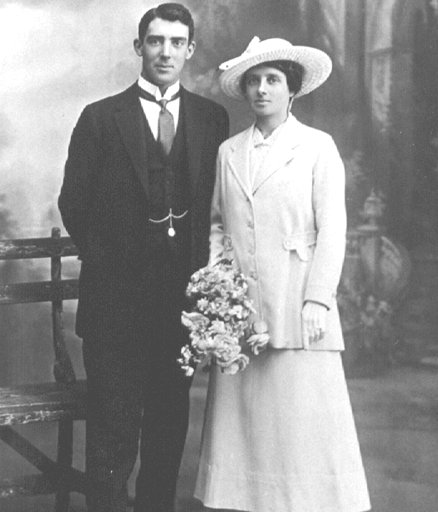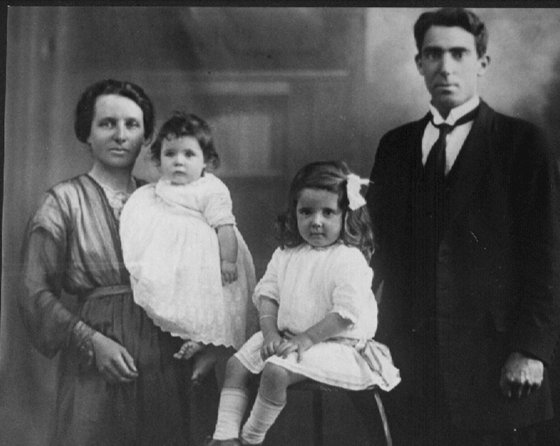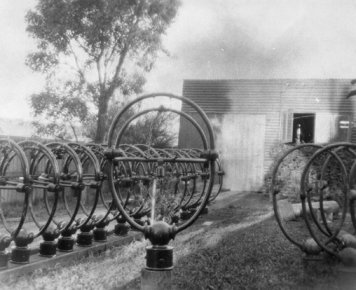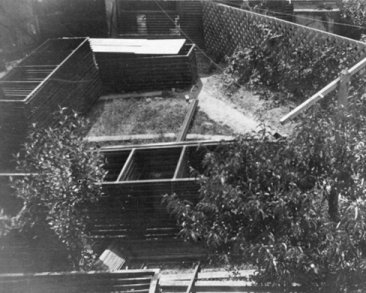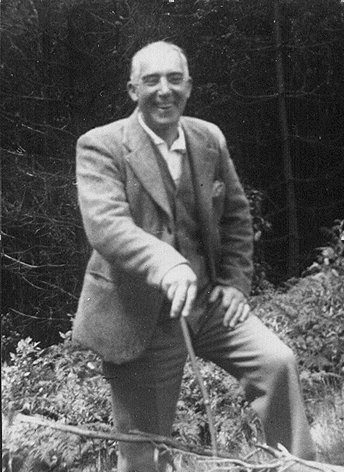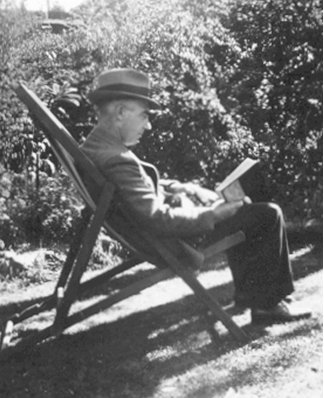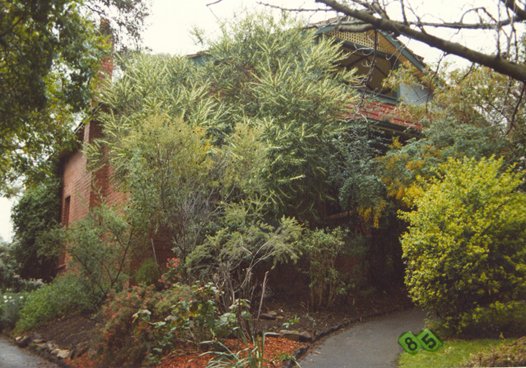|
| ||
|
| ||
|
Sydney William Newman was my father and so many memories crowd into my head about him that I hardly know where to start. So, I will begin with hearsay stories of his childhood. I believe that he was an impossible child to get to bed, so impossible in fact that my grandmother gave up trying and let him wander about until he finally collapsed somewhere in a heap from sheer exhaustion. Then he was picked up and put into his bed. The story always amazed me as one is inclined to believe that strictness was the unfailing rule in a Victorian household. In his adult life he was what I would call "a late night person" as he rarely went to bed before midnight. It is obvious from the way that he spoke of his school days that he was a keen student with a mind always interested and eager to learn. He very much appreciated those of his teachers who had something to give. His eagerness to learn was an attribute that he kept all his life. He often had a dictionary by him when reading and he assiduously looked up any words he did not know. He was also a keen observer and lover of Australian nature and had a strong sense of humour. I believe that my father, or Farve as we called him, met my mother when they were both on holiday in Healesville, in the Victorian countryside. Their courtship was not made easy by the fact that my mother lived in the western suburb in Melbourne of Footscray, and he in an eastern one, Hawthorn. Until recently I had always thought that this distance must have made their courtship difficult but Peter Saunders has now given me copies of Farve's work references and one of them (from The Colonial Ammunition Company Limited, Gordon Street, Footscray) says that he was employed there as a turner from 1st August 1912 to 18th July 1917. So if he was working in Footscray did he have `digs' there somewhere too which certainly would have made him closer to my mother, or was he doing the journey there on his motor bike daily? I think that Farve was very much in love with my mother. My sister although Win had memories of Mum sometimes getting cross with Farve and saying that she should have married some other man who was more affectionate or demonstrative. Win also remembered however that Farve quite often used to gather Mum up in his arms and whiz her around the kitchen in a little dance. Win found this very exciting. Mum and Farve used to go to the mayoral balls but this was fairly disastrous as Farve was not a good dancer and Mum was. Mum used to get dressed up in some beautiful dresses for the balls but there were lots of problems with tying Farve's black tie and with the studs at the back of his collar. An early memory of Farve is of him reading to us around the fire in the breakfast room in the evening. He read "Alice in Wonderland", the Dr.Dolittle books, "Tanglewood Tales" and probably others. In later years he told me that he did not know any children's books himself as a child but as he very much wanted to read to his children he asked around to find the best available. He thoroughly enjoyed reading and often he would be amused at something beyond my understanding and he would go off into great guffaws of laughter which, at the time, used to greatly annoy me. Farve loved the Australian countryside and as a family we would often go into the country for a drive or sometimes for the day when we would take a picnic of Mum's home-made pies, scones and lots of other goodies. Getting ready for the outing was quite a business. Mum would declare that she was ready and was only doing something while waiting for Farve and he would say he was ready and only doing something while waiting for her. We did eventually get off. At home his favourite swear words were "damn and blast the bloody thing" but I believe when he was at work his vocabulary was much more colourful. Farve was a mechanical and electrical engineer, having served an apprenticeship for 4 years and 8 months at the engineering firm of Johns and Waygood. I have a copies of references from the four places of employment where he worked. From the dates on these he does not seem to have been unemployed at any time. The first was when he left his apprenticeship job at Johns and Waygood in which it says that "he has always been diligent and attentive to his work". The second is from a firm called Motor Garage, a motor hire and repair company for whom he worked for 18 months ending on 31st July 1912. Here are the words:- "anyone employing him will find him a first-class tradesman". The third one is from The Colonial Ammunition Company Limited in Footscray. He joined this company one day after he left the Motor Garage. Words in this reference read:- "he carried out his duties to our entire satisfaction". His services were terminated owing to a reduction of hands at this factory undoubtedly because the war was coming to an end. The last reference is from Weymouth's Limited, Electrical and General Engineers. The words here are:- "This is to certify that Mr S Newman was engaged in our works from 19th July 1917 to 31st April 1923 as a Turner, during which time he gave us complete satisfaction. Mr Newman is leaving our employ to start business on his own account. We regret losing his services and trust that he will be successful with his ventures." So this was when the great break was made between being an employee and being self employed. He was in essential industry during the First World War and so was not called up. His brothers were not involved either. Grandma received a white feather because of this, which was terribly disturbing. | ||
|
| ||
|
I have the feeling that Farve was the odd one out in his family as his father was a carpenter and cabinet maker with his own workshop on premises behind his house. Both Farve's younger brothers followed in their father's footsteps although they later became builders. When my parents married, their house at 203 Tooronga Road, Hawthorn, was built by Farve's brothers. It was a brick bungalow with one bedroom. I believe the cost was £1000 which must have been a great deal of money for them. Much later a staircase was put in and two more bedrooms added in the attic. By attending Night School (Working Men's College) Farve improved his education. He was widely read and loved to get into intellectual discussions with knowledgeable people. When Farve first went into business for himself it was sited in a large galvanised iron shed at the bottom of the back garden at 203 Tooronga Road. By the time I was born in 1924, though, he had moved it to Dow Street, Port Melbourne. His standards for his own work were very high and he expected the same from his employees and insisted on getting them. He arrived at work at the same time as the men and I have a feeling that he felt that unless he were there they would play around. One day he was late and his fears seem to have been justified as on that occasion, because of larking about and lack of care, one of the men had his hand caught in some machinery and three of his fingers were ground off. Farve was very upset about it. He himself had lost half of the first finger on his left hand in a similar accident. | ||
|
| ||
|
The depression of 1928/31 hit Farve very badly and he had to lay off his workforce. Everyday he would set off for work knowing that there was very little for him to do. He had borrowed heavily from the bank to start the business and was very much afraid they would foreclose. He used to take out money each week from the bank as if he had wages to pay, and return most of it as if it was for work done. In this way he managed to survive, although it was a close thing. He had bought the two small terraced houses next to his engineering works with an idea of future expansion and at one stage it seemed that our home in Hawthorn would have to be sold and that we would move to one of these houses. I can remember it being talked about to us as if it would be a great adventure but it must have been a real horror to both Mum and Farve. Speaking of this time towards the end of his life brought tears to his eyes. Although strict he was a very fair boss who, although expecting good work from his staff, also gave encouragement and support. He rewarded excellence and was very happy if an apprentice turned out well. I can imagine that his training would have been very conscientious, and if a student was responsive he would have been delighted. One of his apprentices won the Apprentice of the Year Award. Over the years he had invented equipment for many shortcuts to his engineering procedures. These enabled him to quote economic prices when tendering for jobs, and this helped in his success as a businessman. He was well respected in the industry for the excellence of his work and for his honest and fair dealings. Much of his work was making tramway crossings. Another job was the light brackets in Brumton Avenue. He never gave discounts as he considered that the prices he charged were always a fair price. On retirement he sold the business to a man who was an accountant, not an engineer. I don't know why he did this. This man did not appreciate the value of Farve's short cuts and while Mum and Farve were overseas he sold this equipment for scrap - thus limiting the ability to price jobs economically. This was probably one of the reasons why the business suffered badly. However Farve supported the accountant owner who eventually pulled through. Sometimes, as children, in the holidays we would be taken to the engineering works (perhaps to give Mum a break from us). I used to enjoy this and I can smell the special smell of it now when I think of it. I can also see, in my mind's eye the lathes and the furnace where metal was heated. My sister Eileen and I, used to play around in the yard with great piles of rusty metal, on the internal roof of the offices where all sorts of interesting odds and ends were kept and in one of the offices where we would have paper and pencils to use. I can remember the quiet when the machinery stopped at lunch time. I can see now how Farve used to take a 'cat nap' when, after eating his sandwiches, he put his head down on his desk and slept for about 15 minutes. | ||
| ||
|
Engineering works made by Farve in his workshop at 2003
Tooronga Road before moving to Port Melbourne
Left: Light brackets for Brumton Avenue. Right: Tram crossing lines |
||
|
Farve worked long hours, not only while at work but also at home. Very often at night he would have blue prints laid out on the breakfast-room table while he was working out a costing for a job tender. Sometimes at work tiny scraps of metal would fly into one of his eyes while working at a lathe. He had learnt from experience that if he went to the hospital to get these out, the method they used meant that he could not see clearly for some hours so he preferred to take them out himself. I can see him now with a mirror, a candle and the penknife which he used to get out the offending metal. It still gives me the horrors. He had a great sense of humour and a marvellous loud, enjoyable laugh. He enjoyed a bawdy joke and I believe in the early days he used to try and make my mother laugh with them. She "was not amused" and the story goes that in desperation, after one failed joke, he cried out "Laugh, damn you, laugh." Helen tells me that in later days when he went up to her home in Wangaratta he used to sit at the kitchen table while she was pottering around and he would tell her bawdy jokes and they would have a good laugh together. He never told me any, but then he did not see me so often. Farve always had an enquiring mind and never accepted anything without first thinking seriously about it. He had been brought up as a member of the Anglican Church but it could not have satisfied him, as, by the time I was a child we were, as a family, attending a group called "The Free Religious Fellowship". This was a group of, as I remember it, very intelligent and thinking people. I was baptised (or Christened) in this group and I think I can remember my youngest sister Helen was too, but it was not long afterwards that for some reason or other it collapsed. I don't remember Farve going to church again. As I never discussed religion with him I do not know what his beliefs were. However, when he was very ill and at the end of his life, Win brought the Anglican vicar to see him in hospital and he seemed to accept him quite well. His funeral service was at St. John's Anglican Church. He had a great many interests and Douglas Credit, a system of economics based on credit, was a very important one to him. To my shame, I know very little about it, except that it was used, in a diluted form, in Alberta, Canada for some time. He was also interested and good at mathematics, thinking out many processes for himself rather than using the conventional ways. He was often called upon to help neighbouring boys doing higher maths and I think with success, but I myself, could never understand his methods as they were so totally different from those used at school. Another of his interests was Esperanto. He must have been in his fifties when, captured by the ideals of being able to communicate with people in all countries in a common language, he decided to learn the International Language of Esperanto. He had never learnt any other language before and he found it more difficult than he anticipated and, having gone through the book he learned from, I can understand why he gave it up. I have a vague memory of Farve saying that when he was a young man he wanted to join a tennis club but he was not accepted as he was a tradesman, not a professional. In his later life he played bowls but by then Australia had become less class conscious. In 1956 Farve and Mum came to England to see me and my family. They bought a Volkswagen Beetle to tour around England, sometimes with me and my children. Farve and I would often sing old favourite songs like 'Ilkley Moor' as we went along which we very much enjoyed. Eventually Mum and Farve travelled across Europe to Rome where they put both themselves and the car on a boat to go back to Australia. Farve came over to England again on two occasions. One of Farve's pet hates was the way rubbish was disposed of by the local council. At that time this was by burning it in an open space. The rubbish used to smoulder away for days, with a smell which offended Farve's fine sense of smell. When the wind direction from there was towards our house, the sparks really flew. The council could be phoned at any hour of day or night and really given his opinion of them and their rubbish disposal methods. He made a study of rubbish disposal and the ways that it could be disposed of and made use of at the same time. Even when he visited England to visit Eileen and me when he was in his eighties, he went to visit a rubbish disposal plant which he had heard was using and environmentally sensitive method of disposal. | ||
|
| ||
|
A great interest of Farve's was country walking. When we were children and went on holidays to the country he loved to go walking in the bush. He was a very quiet companion, deep in his own thoughts, unless you could talk about geographical or geological features that you noticed which tied up with things that you learned at school and that he was very eager to discuss. It often brought geography lessons alive for me. Later he became a member of the Ramblers walking club in which he also involved many members of his now grown up family. He walked with, and was the President of, the Ramblers in Victoria for many years. In this capacity and also in other groups to which he was attached at other times in his life, he loved to entertain other members at his home with a party. One of the highlights of the party was to play charades - oh, those games of charades! Some groups, notably the Fellowship ones, made real plays of them. The syllables and words acted were so hidden in the many worded plays that I doubt if they were guessable. There was much dressing up, sheets playing a big part in this. Farve really loved dressing up and acting. Another example I remember of this was one year when we were on holiday at Apollo Bay. There was, at the same time, a rather notorious young lady to be seen about the resort. She was a blonde and usually dressed in black. Farve decided to go to the fancy dress party held at our guest house on New Year's Eve, dressed as this young lady. His blonde hair was made from teased-out rope but where he got his black dress from I don't know. All I do know is, that although I was aware that he was dressing up as her, I did not recognise him when I saw him. With his made up face, lipstick etc., he really looked like a woman when he came in dancing with one of the male guests. At later parties country folk dances were done. One in particular, first called the Sir Roger de Coverley and then the Haymakers, became an important part of the family Christmas get-together party, first initiated by Farve at home at 203 Tooronga Road, and for many years continued at the extended Newman family Christmas party, known as the "Newman Do" held every year in a variety of locations usually some time in November. His love of parties continued throughout his life. In his eighty-fourth year when he came to England we took him with us to Belgium when Eldon was on an orchestral tour. We were all accommodated in a university hostel and every night after a concert, as part of the winding down process, different members of the orchestra had a party in their rooms. Farve was always there to participate in the fun and the drinks. After the orchestral tour was finished, we toured France with him. He was intensely interested in everything we saw and did, especially the Roman aqueduct over the Rhone. He also enjoyed the meals (as long as he didn't suspect that they contained garlic.) As part of his love of the Australian Bush, he loved the Australian trees and as soon as he had a home of his own, he determined to grow in his garden the native trees of Australia. Nowadays this is commonly done, but not in his day; then all other gardens had the flowers and shrubs of England in them. He was very much a pioneer in this. I grew up in a house which was surrounded by Eucalypts and Acacias, (as well as almond trees, camellias and other imported trees and shrubs). Another field in which he was a pioneer was in composting garden and kitchen organic material. At first he used to dig large holes in the garden and fill them in with organic rubbish etc. and cover them over with soil, but later he used wooden slatted compost bins. He was also interested in wholemeal foods and invented and made a wheat-grinding machine which he used for making flour for his own bread and porridge making. Although in many ways he was ahead of his time, in other ways he was a man of his own era and with the prejudices of that era. For example he had very little racial tolerance, at least for black people. He also disliked and distrusted Jews as he felt that they had too much influence in monetary matters. In his later years he became rather intolerant of social changes. He considered that much harm was done in the name of 'progress'. Farve was very much a family man and very proud of his daughters and grandchildren. Although it must have been a disappointment to him that he had no one to carry on his business after him, he never showed this in any way that I am aware of. I believe it used to be a source of embarrassment to Mum that he was only interested in his own children and could not show any interest in other children, but as a daughter and a mother I feel that this is by far the preferred way. Gilbert and Sullivan operas were popular with Farve and he sang some of their songs, e.g. 'Tit Willow' He learnt singing from Madam Sartori, who lived in Clifton Road. I am afraid it was a great trial to his daughters to hear him as he did not sing in tune. I think it was a great disappointment to both Mum and Farve that, although we all learnt the piano (except E), none of us had that special gift of being able to sit down at the piano and sight- read or play by ear. | ||
|
| ||
|
Farve always wore a soft felt hat when he went out and a shirt, tie and jacket (quite often a suit). He wore Long John woollen underpants even in summer and cardigans were favoured too. I can't ever remember seeing him in a jumper. He loved apples and would peel and slice them up into small pieces with his penknife. The penknife was always with him. For many years he shaved with a cut throat razor which he sharpened on a strop which hung on a hook behind the bathroom door. He had a silver hinged mirror on a stand and a silver bowl (for hot water) which sat on the left hand end of the bathroom shelf - along with the nail scissors. After Mum's death he cared for himself very well. As time passed he received more and more support from Di and Win. He tried 'Meals on Wheels' briefly, but did not like it. The magazines and papers he received on all sorts of subjects built up in little piles on the table in the breakfast room, eventually leaving only enough room for a small tablecloth and his meal. Unfortunately as he aged he lost his sense of smell. He missed this sense when he was cooking, and several little saucepans became so burnt that he threw them out. A little pile of them was near the incinerator after his death. As far as I know Farve never smoked and he was only a very moderate drinker - of wine. I remember him once telling a story of when he was a young man and out with the `lads'. When the drinking got a bit heavy he used to surreptitiously secrete his glass or dispose of its contents somewhere as he could not bear not to be in full control of himself at any time. I understand the feeling. | ||
|
| ||
|
Towards the end of his life, Farve had several small strokes. Although the family was aware of some of them, some were also not known about at the time. He preferred to keep them secret and only admitted to them at the end. The last one he had was serious enough to put him into hospital, although much against his will. I came out to Australia to see him and I brought with me some photographs we had taken when he had come with Eldon and me to France. When I showed them to him, he relived the holiday and again went off into great guffaws of laughter at some of the remembered incidents. It seemed then that he would recover from the stroke. I think, however, that he realised that he would not be allowed to go on living by himself as he had been and this made him feel that life, without his independence, was no longer worth living. From then on he refused food and drink. The matron at the hospital said that they could try to feed him intravenously, although he would probably tear it out. She went on to say that he was not an easy patient, but added that surely at his age he had the right to choose whether he lived or died. When he slowly slipped away Di, Win and I were with him. He was 87 years old. The things I most like to think about when I remember him are his intense interest in everything about him, his wisdom (he gave me lots of very good advice that I regret I didn't always follow) and his wonderful laugh and sense of humour. |

